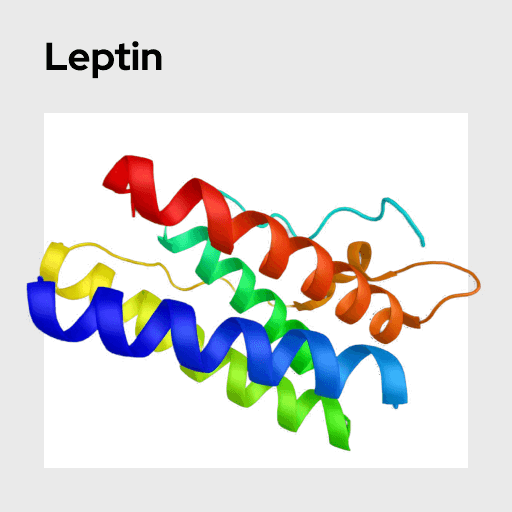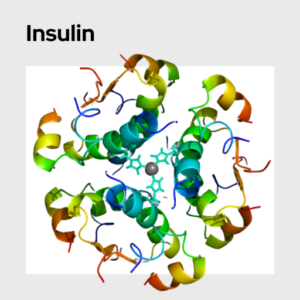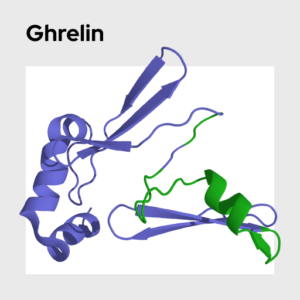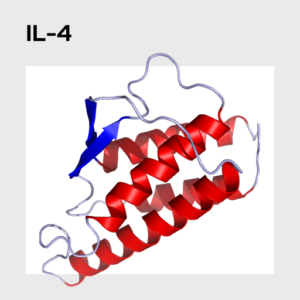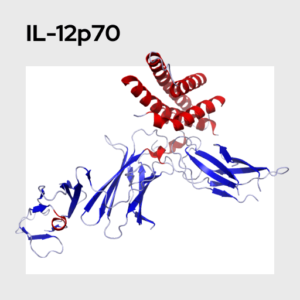Leptin
Leptin is a hormone produced primarily by adipocytes (or fat cells) in the body that plays a role in bodily energy homeostasis. While leptin shows some ability to acutely reduce hunger following a meal, it primarily acts to alter food intake and control energy expenditure over the long term. Leptin has its most profound effect when weight is lost and levels of the hormone fall, which increases hunger and appetite. Diminished tissue sensitivity to leptin (i.e., leptin resistance) is involved in the etiology of obesity and other metabolic disorders.
Name: Leptin
Category: Hunger / Satiety
Type of Test: Blood
Leptin, an important satiety hormone, is a polypeptide composed of 146 amino acids. In the body, leptin’s primary roles are in regulating appetite, energy homeostasis, and neuroendocrine function (i.e. regulating communication between the central nervous system and the endocrine system). Leptin serves as a key mediator in the relationship between food intake and energy stores by promoting patterns of eating behaviors that maintain health energy balance over time.
Leptin is primarily synthesized by white adipose tissue. Accordingly, the amount of leptin circulating the body is directly proportional to the amount of body fat. Thus, as fat stores increase, the presence of leptin in the bloodstream increases (and vice-versa). After release from fat cells, leptin travels through the blood stream, and acts on leptin receptors (LR) in the brain. Through its binding on LR in the brain, leptin serves as signal of long-term energy stores (fat) for the central nervous system. When the amount of leptin reaching the brain is high, the CNS perceives that energy stores are high, which induces a signaling cascade to convey the subjective feeling of satiety. Leptin also plays a role in regulating other biological activities that are sensitive to changes in long-term bodily energy stores, such as reproductive function.
Consistently high levels of leptin may lead to leptin resistance, making the body unresponsive to its signals and resulting in diminished feelings of satiety. Like leptin deficiency, leptin resistance appears to play a role in the etiology of obesity and other metabolic disorders. Accordingly, this hormone is an important biomarker to consider in the study of healthy energy regulation and eating behaviors. Moreover, leptin also appears to regulate reward responsiveness outside the context of eating behavior, suggesting that it may also be of interest to researchers studying the intersection of metabolic function and general reward sensitivity.
Cassioli, E., Rossi, E., Squecco, R., Baccari, M. C., Maggi, M., Vignozzi, L., Castellini, G. (2020). Reward and psychopathological correlates of eating disorders: The explanatory role of leptin. Psychiatry Research, 290, 113071. https://doi.org/10.1016/j.psychres.2020.113071
Fulton, S., Woodside, B., & Shizgal, P. (2000). Modulation of brain reward circuitry by leptin. Science, 287, 125-128. https://pubmed.ncbi.nlm.nih.gov/10615045/
Geary, N. (2004). Endocrine controls of eating: CCK, leptin, and ghrelin. Physiology & Behavior, 81, 719-733. https://doi.org/10.1016/j.physbeh.2004.04.013
Hao, J., de Vaca, S. C., Pan, Y., & Carr, K. D. (2006). Effects of central leptin infusion on the reward-potentiating effect of D-amphetamine. Brain Research, 1087, 123-133. https://psycnet.apa.org/record/2006-07457-006


